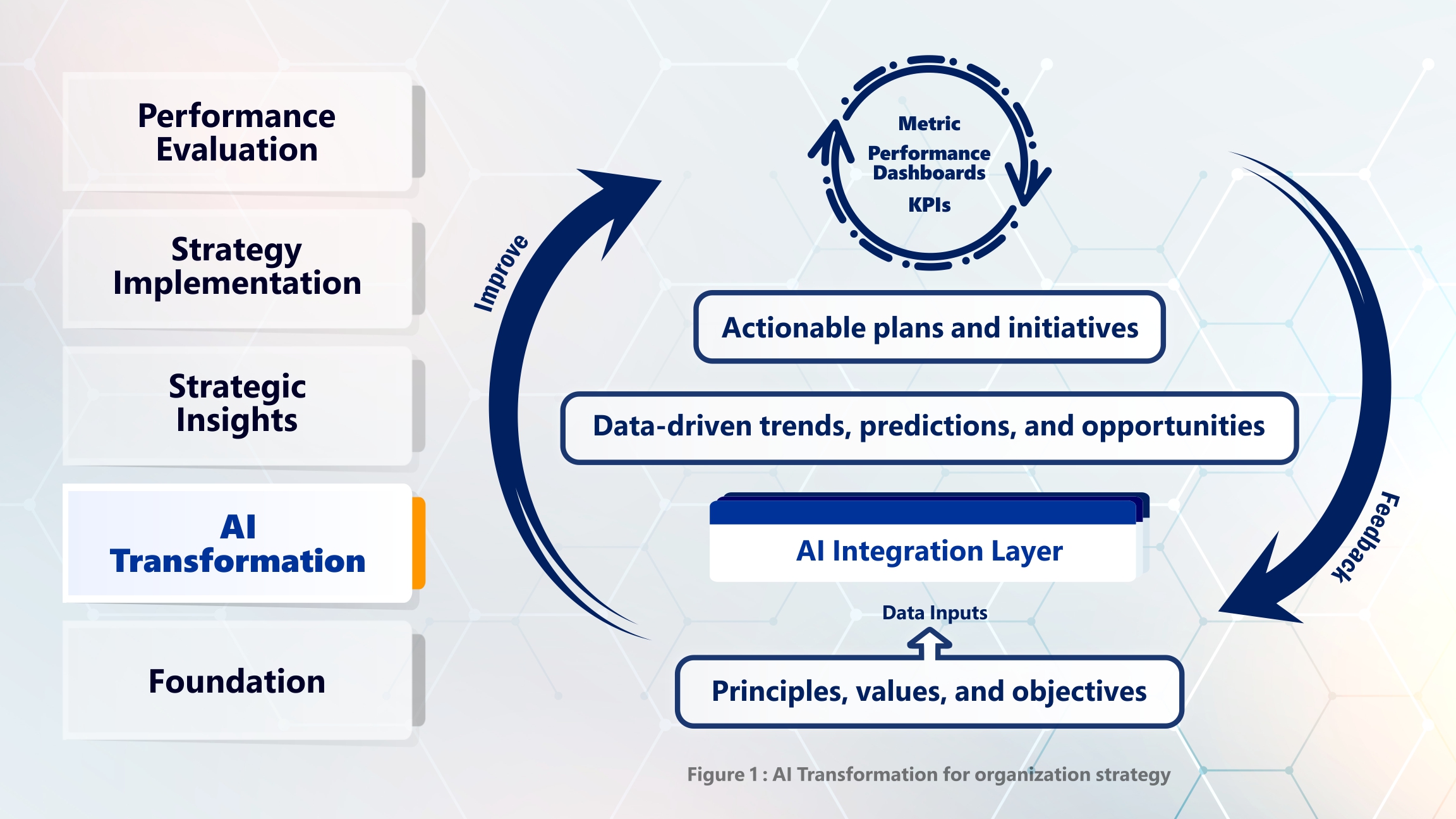
Introduction
In today's fast-paced and ever-changing business world, organizations are always looking for ways to stay ahead of the curve. The importance of artificial intelligence (AI) is growing in many fields and sectors. This is due to its enormous ability to perform analysis, forecasting, and classification. AI is widely used, and efforts are being made to invest in its potential to develop organizational performance and achieve strategic plans, as well as to predict future initiatives. Despite the progress made in this field, the effective role of AI in building strategic plans for institutions still requires further activation. This is due to the difficulty of trusting the machine to match the plans that leaders and executives have for the future, especially in the absence of the data necessary for those predictions. This paper explores the critical role of AI in shaping organizational strategy, highlighting its transformative potential for measuring performance.
Organizational strategy
Organizational strategy is a plan for how a business will reach its goals. It includes how the business will make decisions, use its resources, and work together. In the past, strategy was developed by people who used data from the past, market analysis, and their judgment. But this approach has limits, especially in business environments that are changing quickly.
The Dynamic Business Landscape
The business world is constantly changing, and it can be hard for businesses to keep up. This is known as a VUCA business landscape, which stands for volatility, uncertainty, complexity, and ambiguity. Things like market dynamics, customer preferences, and competitive pressures can all change quickly, making it difficult for businesses to stay ahead. This means that businesses need to be able to adapt to change quickly and use data to make decisions.
In other words, the business landscape is constantly changing and unpredictable. This makes it difficult for businesses to plan and stay ahead of the competition. To succeed in this environment, businesses need to be able to adapt to change quickly and make decisions based on data.
AI and Organization Performance
Without a clear understanding of the results; a correct evaluation of the assumptions or tracking the information will have major consequences and may lead organizations to implement initiatives that do not match the vision of the organization. Therefore, the strategic expert needs to understand the tools used, the assumptions based on the results, and the factors affecting the prediction.
Therefore, AI techniques play a vital role in building the components of the strategic plan. In addition to supporting leaders in making more accurate and timely decisions, through data analysis, providing insights, predicting future initiatives, and identifying potential risks. For this reason, the role of organizational awareness appears as a fundamental task to sense the possibility of investing and activating this technology effectively and consciously, enhancing productivity, and building strategic plans carefully.
The diverse patterns of AI in the field of organizational performance come to play an active role, the first of which lies in simple analysis, which is descriptive intelligence. It is based on the analysis of the information available in the work environment to understand the current situation and identify the areas that need improvement.
The second pattern is represented in diagnostic intelligence, which is the ability to review the company's historical data and information; understand the factors for success and increased productivity, and study the factors affecting the company. Currently, diagnostic intelligence has made many things easier for leaders and decision-makers to know the deep roots of challenges and factors affecting performance.
The third pattern is predictive intelligence. This type is based on algorithms used in strategic planning to predict what will happen in the future, based on previous experiences according to external factors. Therefore, it gives accuracy to know the future values and expected plans instead of relying on human analysis and intuition. Like analyzing data to predict the level of satisfaction or employee resignations, which helps in taking early measures to improve the employee experience and maintain competencies.
These patterns complement each other in the world of AI and organizational performance, and their use saves a lot of time and effort.
AI-Driven Organizational Strategy Transformation
The rapid emergence and evolution of new business models have created a significant change in how organizations approach their strategy development. AI has become a crucial component of this transformation.
Despite the advantages of AI, implementing it in an organization has its challenges. Some of these include
To fully realize the potential of AI, organizations need to successfully navigate these issues.
Figure 1 visualizes how AI can transform an organization's strategy. It starts by establishing an organizational foundation, which allows data from various sources to be inputted. Through the integration of AI, the resulting insights are then analyzed and used to develop effective strategies. The continuous evaluation of performance results provides a feedback loop that allows for agile strategy development.

The Impact of AI on Jobs
The dynamic reach and use of AI technologies for organizational performance also affect the jobs of the current workforce who manage organizational performance and may get replaced with more suitable jobs. Therefore, employees must develop new skills to adapt to this change. For example, instead of spending their time collecting and analyzing data, if professionals managing organizational performance focus more on strategic initiatives, such as developing and implementing processes, then organizational productivity may increase tremendously.
Conclusion and the future of AI in organizational performance
By integrating AI into the process of developing organizational strategy, businesses can position themselves for success in the digital age. While AI offers great potential for improvement in the field of organizational performance, it is important to use these technologies responsibly and consciously.
AI is still a relatively new technology, but it has the potential to revolutionize the way organizations operate. In the future, AI is expected to play an even greater role in organizational performance. AI is expected to be used to develop new and innovative strategies and programs to improve organizational performance. AI is also expected to be used to create new jobs and to improve the productivity of existing jobs.
Follow us: